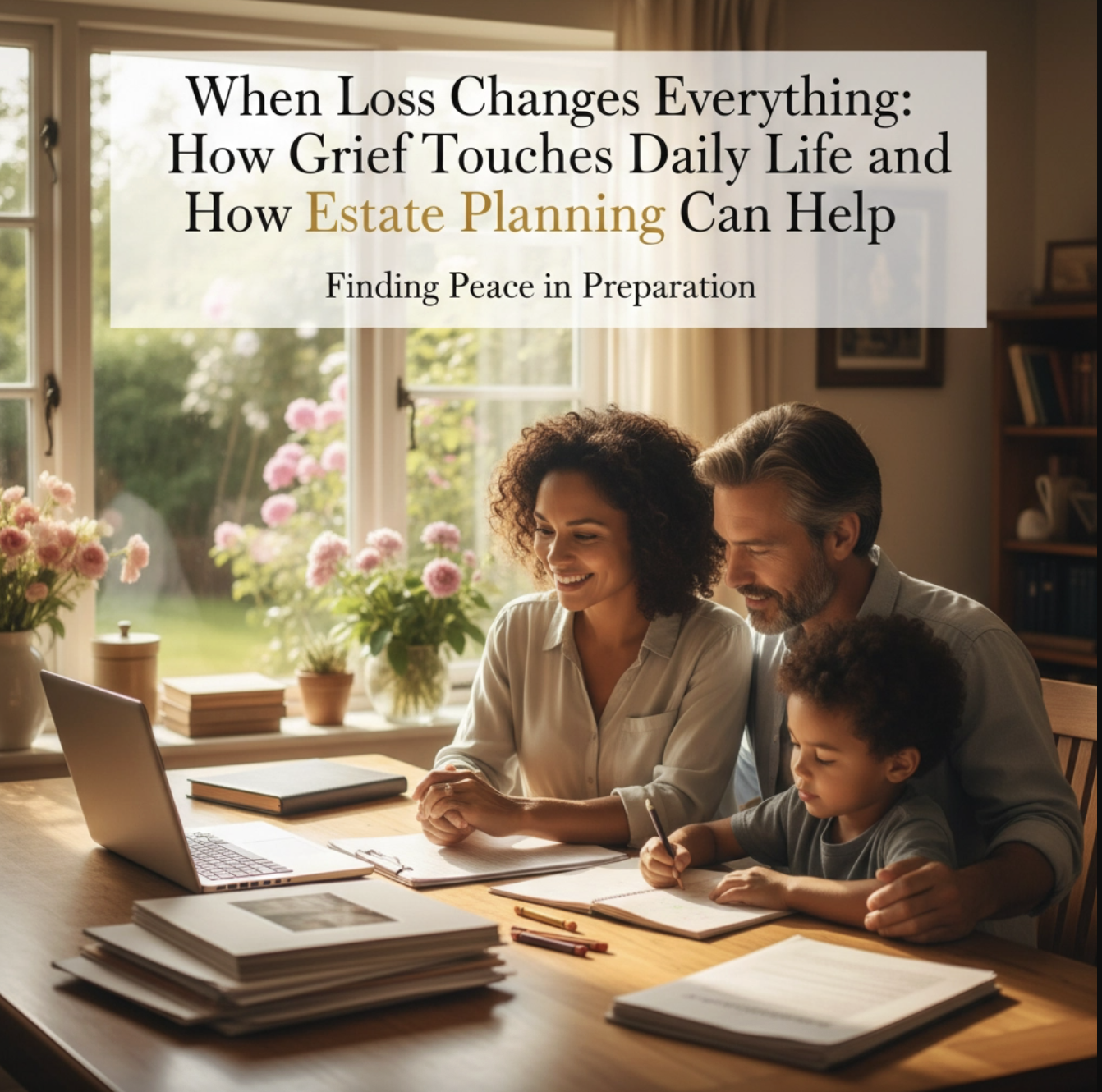The phone rings, but it’s not them. The birthday passes, but there’s no call to make. Sunday dinner feels hollow with an empty chair. When you lose someone you love, the world doesn’t stop: but yours does, at least for a while.
If you’ve experienced the death of someone close to you, you know that grief isn’t just sadness. It’s the moment you reach for your phone to share good news, only to remember they won’t answer. It’s walking past their favorite restaurant and feeling your chest tighten. It’s the way your daily routines suddenly feel foreign and your relationships shift in ways you never expected.
And if you’re reading this because you want to spare your own loved ones some of that pain, you’re in the right place. Because while we can’t eliminate grief, we can absolutely reduce the chaos and confusion that often makes it so much worse.
The Daily Reality of Grief: More Than Just Missing Someone
When loss first hits, it’s like learning to live in a world where gravity works differently. Everything that used to be automatic: eating, sleeping, working, talking to friends: suddenly requires conscious effort.

Your brain fog makes it hard to concentrate on even simple tasks. You might find yourself standing in the grocery store, unable to remember what you came for, or sitting at your desk staring at your computer screen without processing a single word. This isn’t weakness: it’s your mind trying to process an enormous emotional load while still keeping your body functioning.
Sleep becomes your enemy and your refuge at the same time. You’re exhausted but can’t fall asleep, or you sleep too much because it’s the only escape from the constant ache. Your appetite disappears entirely, or food becomes your only comfort. These physical symptoms aren’t just uncomfortable: they can persist for months or even years, making it incredibly difficult to care for yourself, let alone handle complex decisions about finances, property, or legal matters.
Then there are the social changes. Friends don’t know what to say, so some disappear entirely. Others hover uncomfortably, offering help you don’t know how to accept. Family dynamics shift as everyone processes grief differently: some want to talk constantly about your loved one, others want to move forward quickly. These relationship changes happen precisely when you need support the most.
When Grief Gets Complicated
For many people, acute grief gradually becomes more manageable over time. But for others, what mental health professionals call “complicated grief” sets in, where the intense pain doesn’t ease and actually interferes with your ability to function in daily life.
You might find yourself unable to accept that your loved one is really gone, even months later. Or you might blame yourself for their death, replaying conversations and wondering what you could have done differently. Some people withdraw from everyone and everything that once mattered to them, while others become unable to make even basic decisions about their own lives.
This is when grief becomes not just an emotional experience, but a barrier to living. And it’s exactly when having clear, comprehensive plans in place becomes most crucial: both for the person who died and for the people left behind.
The Hidden Burden: Decision-Making During Grief
Here’s something most people don’t think about until they’re in the middle of it: when someone dies, the grieving process doesn’t happen in a vacuum. There are dozens, sometimes hundreds of decisions that need to be made quickly, often within days or weeks of the death.

What happens to the house? Who has access to bank accounts? How are bills paid? What about investments, business interests, or digital accounts? If there are minor children involved, who cares for them immediately? How are medical expenses handled? What about ongoing care for a surviving spouse?
When you’re struggling to remember to eat breakfast or shower regularly, these decisions feel impossible. Worse, family members often disagree about what the deceased person would have wanted, leading to conflicts that can damage relationships permanently.
This is where the intersection of grief and estate planning becomes so important. Because the most loving thing you can do for your family isn’t just to leave them money: it’s to leave them clear directions so they don’t have to make impossible decisions while their hearts are breaking.
How Estate Planning Becomes a Gift During Grief
Think of comprehensive estate planning as building a bridge between the chaos of loss and the stability your family needs to heal. When someone has taken the time to create detailed plans, surviving family members can focus on supporting each other instead of arguing about what should happen next.
Financial Stability When Everything Feels Unstable
Proper estate planning ensures that money flows smoothly to the people who need it, exactly when they need it. This might mean setting up trusts that provide immediate funds for daily expenses while preserving larger inheritances for later. Or it could mean life insurance policies that replace lost income so surviving spouses don’t have to worry about paying the mortgage while they’re learning to live alone.
When your world has been turned upside down by loss, knowing that practical needs are handled allows you to focus on the emotional work of grieving without the added stress of financial uncertainty.
Removing the Burden of Impossible Decisions
One of the most valuable gifts you can give your family is taking difficult decisions off their shoulders entirely. Healthcare directives that clearly state your wishes for end-of-life care mean your family doesn’t have to guess what you would want during a medical crisis. Detailed distribution plans prevent arguments about who gets what, and instructions for digital assets ensure nothing important gets lost in online accounts.

These documents don’t just provide legal clarity: they provide emotional relief. When family members know they’re honoring your explicitly stated wishes, they can feel confident in their choices instead of second-guessing every decision.
Preserving Family Relationships
Grief puts enormous stress on family relationships, and uncertainty about inheritance or care decisions often becomes the breaking point. Clear estate planning helps prevent the kinds of conflicts that can tear families apart exactly when they need each other most.
When adult children know that their parents’ estate plan reflects thoughtful consideration of everyone’s needs, they’re much more likely to support each other through the grieving process instead of viewing each other as competition.
Practical Tools That Make a Real Difference
Living Trusts: Avoiding Probate When It Matters Most
Probate: the court process of settling an estate: can take months or years and often freezes assets when families need them most. A properly funded living trust allows your trustee to distribute funds immediately for funeral expenses, ongoing bills, and family support without waiting for court approval.
Advanced Healthcare Directives: Clarity in Crisis
These documents do more than specify medical treatments: they can also designate who makes decisions, where you want to receive care, and what kind of support you want your family to have during difficult medical situations.
Digital Asset Planning: The Modern Necessity
Your social media accounts, online banking, digital photos, and cloud storage contain both practical and sentimental value. Clear instructions about digital assets prevent additional stress and ensure nothing important is lost.
Guardianship Designations: Immediate Security for Children
If you have minor children, naming guardians in your estate plan provides immediate clarity about who will care for them. This prevents court battles and ensures your children have stability during an already traumatic time.
The Timing That Changes Everything
The most effective estate planning happens during calm periods, not crisis moments. When families have time to discuss wishes and values without pressure, they can process information thoughtfully and ask important questions.
These conversations also help prepare family members emotionally for future losses. While talking about death isn’t easy, families who have discussed estate plans often report feeling more connected to each other and better prepared to support each other when loss occurs.
Creating Your Family’s Safety Net
Estate planning isn’t really about death: it’s about love. It’s about recognizing that loss is inevitable but chaos doesn’t have to be. When you create comprehensive plans, you’re building a safety net that catches your family when they’re falling and provides the stability they need to find their footing again.

Your grief will be real and painful regardless of how well you plan. But you can spare your loved ones the additional burden of making difficult decisions while their hearts are breaking. You can ensure they have the financial resources they need and the clear guidance that prevents family conflicts.
Most importantly, you can give them the gift of being able to focus on what matters most during their time of loss: remembering you, supporting each other, and beginning the long journey of healing.
Taking the First Step
If you’re ready to create this safety net for your family, don’t wait. The most loving thing you can do is start this process while you’re healthy and your family is together. The conversations might feel difficult at first, but they get easier, and the peace of mind they provide is immeasurable.
At the Law Offices of Sotera L. Anderson, we understand that estate planning is about much more than legal documents: it’s about protecting the people you love most during their most vulnerable moments. We’ll help you create a comprehensive plan that addresses not just the legal requirements, but the emotional needs of your family during grief.
Ready to give your family the gift of clarity and peace of mind? Call 855-965-3666 or schedule a free 15-minute call. Your future self: and your grieving family( will thank you for taking action today.)




